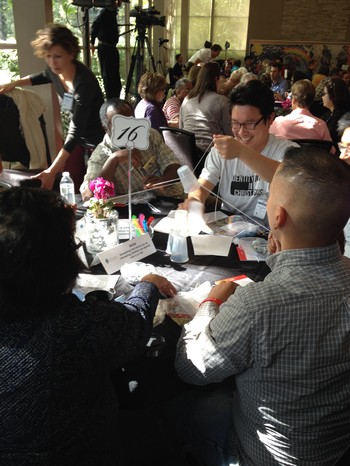If we want to save the world, humans must engage in 21 billion hours per week of gaming, world-renowned video game designer and futurist Jane McGonigal told an enthusiastic crowd of 150 today (Oct. 16) at the launch of San Francisco Theological Seminary’s Center for Innovation in Ministry.
“We want to make it as possible to save the world in real life as it is in game life,” said McGonigal, author of the best-seller Reality is Broken: How Games Make Us Better and How They Can Change the World. She has created “games for good” for such organizations such as the World Bank, the Olympic Games, the American Heart Association and the New York Public Library, among others.
People, particularly young people but growing segments of the world population, “play games because we feel we’re not as good at real life as we are at game life,” McGonigal said. “In game world we become the best versions of ourselves. In real life we feel frustrated, cynical, hopeless, underachieving.”
But gamers are developing skills – cooperation, collaboration and creativity among others – that are essential to solving real world problems such as hunger, environmental degradation and the breakdown of the social fabric, McGonigal said.
“These are people who believe they are capable of saving the world, but it’s a virtual world,” she continued. “But what if gamers were to apply these sills to real life?”
Gamers talk of the “epic win” – a game victory so “startling and unexpected that you didn’t even know it was possible until it occurs,” McGonigal said, flashing a hilarious photo taken of a young gamer at the moment of such a victory.
“People don’t look like epic winners in church,” noted the Rev. Sarah Moore-Nokes, general presbyter for Winnebago Presbytery and a responder to the presentation, who said McGonigal’s book “changed my work completely.”
The principles undergirding gaming – goals, rules, feedback and voluntary participation – “are a good guide for organizational structure, Moore-Nokes said. “We need to stop talking about institutional demise and start talking about epic wins.”
Winning gamers have mastered four life-skills, McGonigal said:
- “urgent optimism” -- high levels of motivation
- tight social fabric -- “we like people better after we’ve played with them”
- “blissful productivity” – people are happier when they’re engaged in activities they love
- “epic meaning” – the amassing of huge stores of knowledge
Responder Mary Hess, a Catholic laywoman who is professor of educational leadership at Luther Seminary, said, “What’s theological about games? Everything!” The biblical story of God’s relationship with God’s people “is epic meaning at its best,” she said.
“The theology that we are IN the story, not just being told the story, very much resonates with gamers,” McGonigal replied.
Responder Derrick Kikuchi, owner of “Reach and Teach” – a peace and justice learning company that designs games that educate people of all ages about social justice issues – told about a young boy in Afghanistan and a poor community in El Salvador who were transformed by the power of games. “Genuine play doesn’t require winners and losers,” he said. “Health is the outcome of playing games.”
“We can make any future we can imagine and we can create any games we want,” McGonigal said, “so let the games begin!”
San Francisco Theological Seminary’s Center for Innovation in Ministry has been created “to encourage faith communities to think and act creatively about how they can engage the world with the good news of the Gospel. The Center is not just another think tank – it is a “think, do and be” tank that will build capacity for innovation in the church, connect innovators to each other and connect innovators to the church.
Presenters at future Center events include John Bell of the Iona Community in Scotland, former General Assembly Moderator Bruce Reyes-Chow, renowned theologian Phyllis Tickle, and popular worship innovator Marcia McFee, who led opening worship for the launch event.

